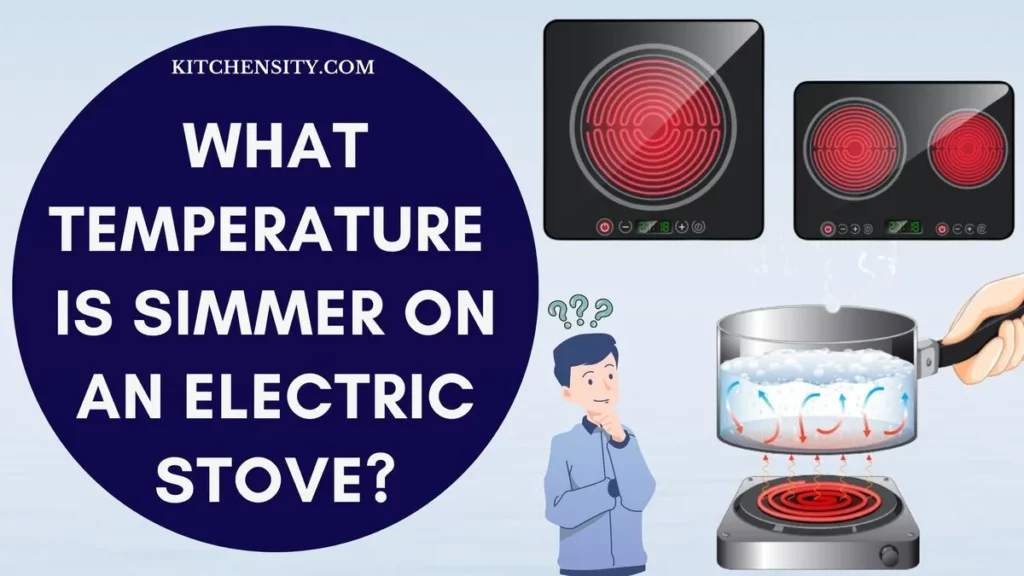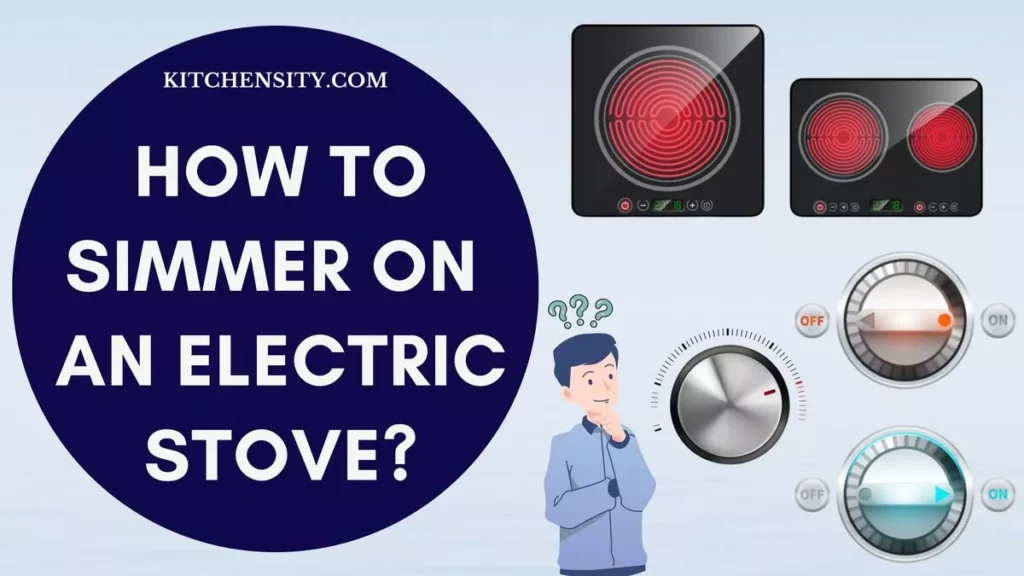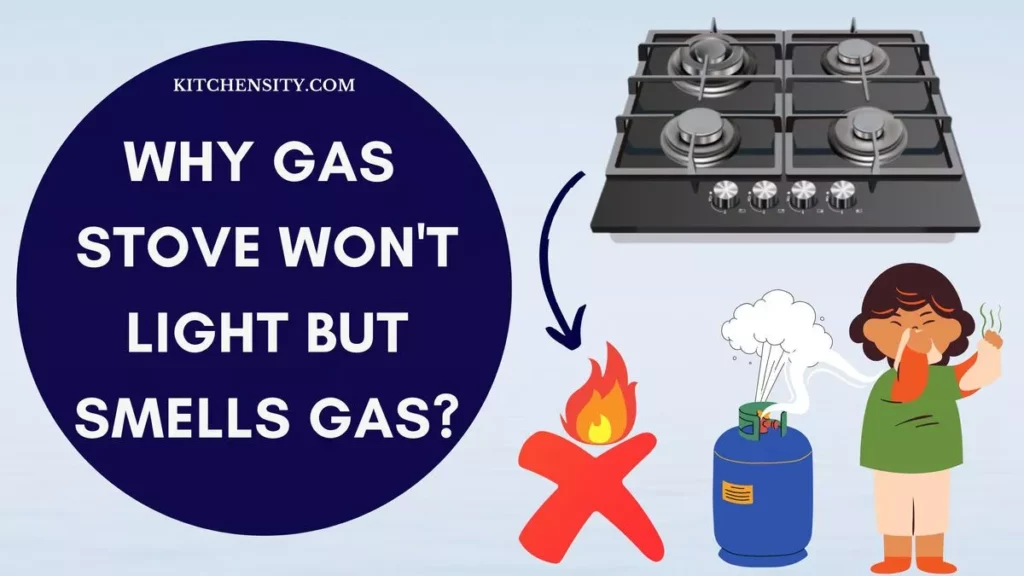When it comes to cooking in the kitchen, electric stoves have become an essential appliance for many households. They offer convenience, efficiency, and precision in cooking.
But, leaving the electric stove on is a common household mishap that can lead to various consequences.
In this article, we will explore the potential dangers and outcomes of forgetting to turn off your electric stove or for how long can you safely leave the electric stove on.
We will explore the factors that influence the safety of leaving your electric stove unattended and provide tips to ensure a secure cooking experience.
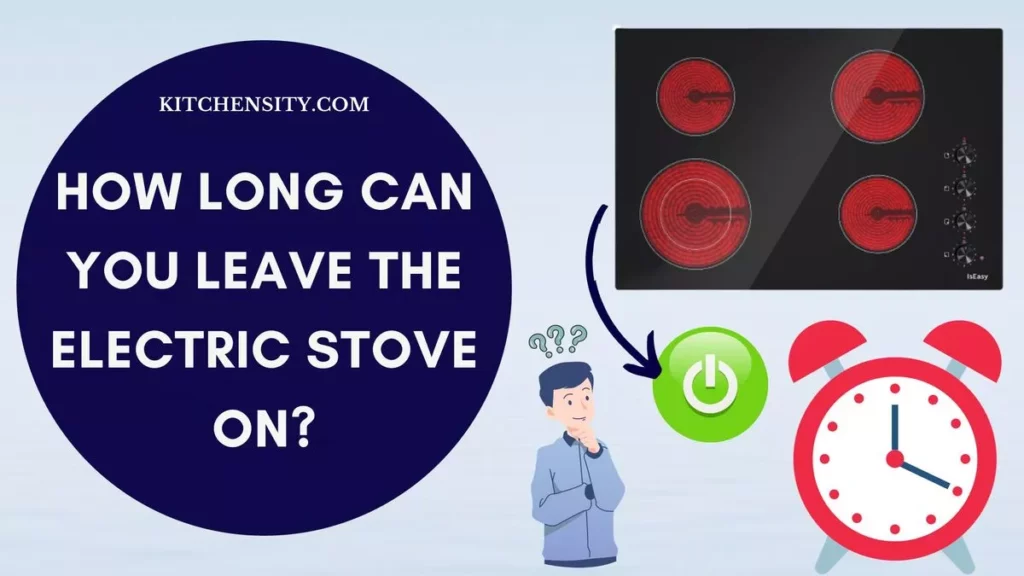
Table of Contents
- 1 How Long Can You Leave The Electric Stove On?
- 2 The Forgotten Stove: A Common Scenario
- 3 What Happens If You Leave The Electric Stove On?
- 4 What to Do If You Forget To Turn Off The Electric Stove?
- 5 What Happens If I Accidentally Left The Electric Stove On Overnight?
- 6 Can An Electric Stove Catch Fire If Left On?
- 7 How To Prevent The Stove Related Incidents?
- 8 Do Electric Stoves Turn Off Automatically?
- 9 What Are The Safety Precautions To Take?
- 10 Final Verdict
- 11 FAQs (Frequently Asked Questions)
- 11.1 Can I Leave My Stove On For 3 Hours?
- 11.2 Can Leave An Electric Stove On Burn A House Down?
- 11.3 Is It Safe To Leave An Electric Stove Unattended For A Few Minutes?
- 11.4 Can Smart Stoves Prevent Accidents Entirely?
- 11.5 Can I Leave The Stove On While Leaving The House For A Short Errand?
- 11.6 What Should I Do If I Notice Smoke Coming From The Stove?
- 11.7 What Should I Do If A Fire Breaks Out On The Stove?
- 11.8 How Can I Estimate The Additional Energy Cost Of Leaving The Stove On?
- 11.9 Are There Any Safety Devices Specifically Designed For Electric Stoves?
How Long Can You Leave The Electric Stove On?
Most electric stoves can be left on for up to 12 hours without any problems. However, it is best to turn it off sooner if you can. Leaving the stove on for an extended period of time can waste energy and increase the risk of a fire.
While short periods of cooking with supervision are generally safe, it’s advisable to stay in the kitchen during the entire cooking process and avoid leaving the stove on overnight or when leaving the house.
Leaving it on for long periods can pose fire hazards, increase energy costs, and risk damage to the appliance.
Safety precautions like using timers, keeping flammable objects away, and having smoke detectors and a fire extinguisher on hand are essential when using an electric stove.
Also Read – How Hot Do Electric Stove Burners Get?
The Forgotten Stove: A Common Scenario
In the hustle and bustle of our daily lives, it’s easy to become preoccupied with numerous tasks and responsibilities. Cooking is one such essential task that often requires our full attention.
Yet, even the most diligent and careful individuals can find themselves facing a common and potentially dangerous scenario: leaving the electric stove on inadvertently.
Imagine this scenario: You’ve just finished cooking a delicious meal and sat down to enjoy it. Suddenly, the doorbell rings, and you’re engrossed in a conversation with unexpected guests. In the midst of all this, you forget to turn off the electric stove. What happens next?
What Happens If You Leave The Electric Stove On?
Leaving the electric stove on, even unintentionally, can lead to a series of potentially hazardous and costly outcomes. In this section, we will explore these consequences in detail, shedding light on why it’s crucial to never forget to turn off your electric stove.
1. Fire Hazard
One of the most immediate and severe risks associated with leaving an electric stove on is the potential for a fire hazard. Electric stoves generate intense heat through coils or burners. When left unattended for extended periods, these elements can heat up to dangerous levels.
The primary danger lies in the fact that various combustible materials are typically found in a kitchen. Items like kitchen towels, wooden utensils, paper, or even nearby curtains can catch fire if they come into contact with the scorching hot elements.
This can quickly escalate into a kitchen blaze, which, if not contained promptly, can spread to other parts of the home, endangering lives and causing extensive property damage.
2. Energy Consumption
Leaving an electric stove on unnecessarily also results in excessive energy consumption. Electric stoves are power-hungry appliances, and when they remain active without any cooking taking place, they continue to draw electricity. This not only contributes to higher electricity bills but also places unnecessary strain on the power grid.
Modern stoves are designed to be energy-efficient when used correctly. However, when left unattended, they become energy-wasting machines, consuming power that could be better utilized elsewhere.
This is not only detrimental to your finances but also to the environment, as it contributes to increased energy demand and carbon emissions.
Also Read – Why Gas Stove Won’t Light But Smells Gas?
3. Food Safety
Apart from the fire and energy-related concerns, leaving food unattended on an electric stove can have adverse effects on your meal’s quality and safety.
Overcooking or burning food is a likely outcome, as the heat continues to be applied to the pot or pan. This can lead to meals that are unpalatable, charred, or even inedible.
In some cases, overcooking can also result in the production of harmful substances. For instance, overheating oils can release acrid smoke and potentially toxic fumes into the air, posing a health risk to anyone in the vicinity. Such situations not only result in wasted food but can also lead to health issues if the contaminated air is inhaled.
4. Impact On Appliances
Leaving the electric stove on for extended periods can also have a detrimental effect on the stove itself.
Excessive heat exposure can cause wear and tear on the stove’s components, potentially reducing its lifespan and efficiency. Frequent overheating may lead to the need for costly repairs or even the replacement of the appliance.
5. Environmental Impact
In a broader context, leaving appliances like electric stoves running when not in use contributes to unnecessary energy consumption and, consequently, a higher carbon footprint. This aligns with the global push for energy conservation and sustainability.
By practicing responsible appliance use and turning off the stove when not needed, individuals can contribute to reducing their environmental impact.
So, leaving the electric stove on is a situation that should be avoided at all costs. The risks are not limited to fire hazards but also encompass increased energy bills, compromised food safety, potential appliance damage, and environmental consequences.
Being vigilant in the kitchen and ensuring that the stove is always turned off when not in use is a simple yet effective way to prevent these negative outcomes and maintain a safe and efficient cooking environment.
Also Read – What Happens If You Use Propane On A Natural Gas Stove?
What to Do If You Forget To Turn Off The Electric Stove?
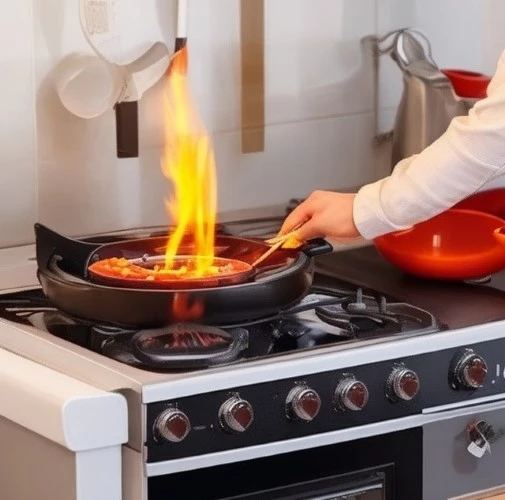
If you ever find yourself in the unfortunate situation of realizing that you’ve forgotten to turn off the electric stove, it’s essential to take immediate and deliberate steps to address the issue.
Here’s a step-by-step guide on what to do if you forget to turn off the electric stove:
- Stay Calm: The first and most crucial step is to remain calm. Panicking can cloud your judgment and hinder your ability to deal with the situation effectively. Take a deep breath and focus on resolving the problem.
- Approach With Caution: Approach the stove cautiously. Ensure your safety by keeping a safe distance from any potential hazards, such as hot burners or pans. Use oven mitts or pot holders to protect your hands from burns.
- Turn Off The Stove: Once you are near the stove, immediately turn it off. If it’s an electric coil or burner stove, use the controls to switch off the burners. For a smooth-top stove, use the appropriate buttons or knobs to power down the heating elements.
- Remove Flammable Objects: Check the immediate vicinity of the stove for any flammable objects or materials that may have been placed too close to the heat source. If you find any, carefully move them away to prevent the risk of fire.
- Allow It To Cool: After turning off the stove, allow it to cool down naturally. Do not attempt to speed up the cooling process by using water or any other liquid, as this can cause damage to the stove and create a safety hazard.
- Assess For Damage: Once the stove has cooled down, assess it for any signs of damage or overheating. Inspect the cookware on the stove as well to ensure that it has not been damaged due to excessive heat.
- Ventilate The Area: If there is a strong smell of burnt food or if you suspect a fire has occurred, open windows and doors to ventilate the area. This helps dissipate any lingering smoke or odors. If necessary, use fans to assist with ventilation.
- Check For Fire: If you suspect that a fire may have started, carefully inspect the stove and its surroundings for any flames. If you see a fire, do not attempt to extinguish it with water, as this can worsen a grease fire. Instead, use a fire extinguisher if you have one, or call 911 immediately for professional assistance.
- Address Any Damage: If you discover damage to the stove or cookware, refrain from using them until they have been inspected and repaired by a professional. Operating a damaged stove can be hazardous.
- Learn From The Experience: Use this incident as a learning opportunity to reinforce the importance of stove safety. Reflect on what led to the oversight and take measures to prevent it from happening in the future. Consider implementing safety devices or reminders to enhance your stove safety practices.
Remember that safety should always be a top priority in the kitchen. By following these steps and practicing vigilance, you can effectively handle the situation if you ever forget to turn off the electric stove, minimizing potential risks and hazards.
Also Read – Master Medium Heat On A Stove
What Happens If I Accidentally Left The Electric Stove On Overnight?
If you accidentally left the electric stove on overnight, it is unlikely that anything serious will happen. Most electric stoves have an automatic shut-off feature that will kick in after a certain period, usually 12 hours. However, there are a few things that could happen if you leave the stove on overnight:
- The food you are cooking could burn.
- The cookware could warp or melt.
- The heating element could burn out.
- There is a very small risk that a fire could start, but this is highly unlikely if there is nothing flammable near the stove.
If you wake up and realize that you left the stove on overnight, the first thing you should do is check the food. If it is burned, you will need to throw it away. If the cookware is warped or melted, you may need to replace it. You should also check the heating element to make sure that it is not damaged.
If you are concerned about the risk of a fire, you can call the fire department to have them check the stove. However, it is important to note that the risk of a fire is very low if there is nothing flammable near the stove.
Here are some tips to help you avoid leaving the stove on overnight:
- Get into the habit of turning off the stove after each use.
- If you are leaving the house for an extended time, turn off the stove and unplug it.
- If you have to leave the stove on for a long period, make sure that there is nothing on the burners and that the area around the stove is clear of flammable materials.
Also Read – Should A Slow Cooker Simmer On Low?
Can An Electric Stove Catch Fire If Left On?
It is possible for an electric stove to catch fire if it is left on for an extended period of time. However, the risk of this happening is very low if there is nothing flammable near the stove.
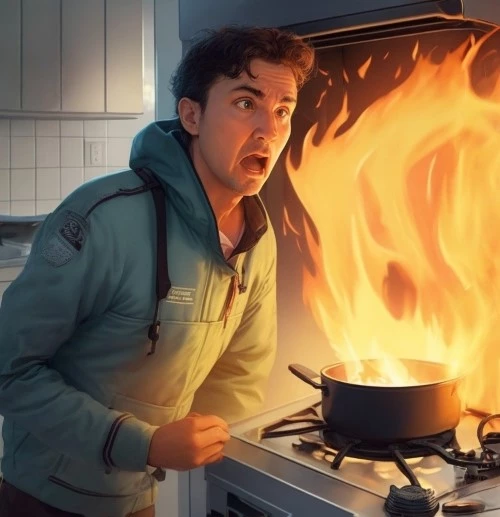
The most likely scenario for a fire is if the food on the stove is allowed to burn. This can happen if the stove is left on high heat for a long time, or if the food is not properly monitored. If the food burns, it can produce smoke and fumes that can be flammable. If these fumes come into contact with a spark or flame, they could start a fire.
Another possible scenario is if the heating element on the stove becomes damaged. This could happen if the stove is dropped or if something heavy is placed on it. If the heating element is damaged, it could short-circuit and start a fire.
However, it is important to note that these scenarios are very unlikely. Most electric stoves have safety features that will prevent them from catching fire. \
For example, many stoves have an automatic shut-off feature that will turn off the stove after a certain period. Additionally, most stoves are made with fire-resistant materials.
Also Read – Is Simmer Lower Than Low?
How To Prevent The Stove Related Incidents?
Preventing stove-related incidents is crucial for your safety and the well-being of your home. Here are some effective strategies to ensure that you never leave your stove unattended and minimize the risk of accidents:
- Use Timers And Alarms: Many modern electric stoves come equipped with timer features that allow you to set a specific cooking time.
- Utilize these timers to automatically turn off the stove once your food is cooked.
- If your stove doesn’t have this feature, consider using a kitchen timer or your smartphone’s alarm to remind you to check on your cooking.
- Visual Reminders: Place visual reminders in your kitchen as a fail-safe method.
- A simple yet effective approach is to leave a bright-colored object or a sticky note near the stove.
- These eye-catching reminders can serve as visual cues, prompting you to remember to check and turn off the stove.
- Smart Home Technology: Investing in smart home technology can be a game-changer in stove safety.
- Smart stoves and smart plugs can be controlled remotely through your smartphone. This means you can monitor and control your stove even when you’re away from the kitchen.
- If you ever forget to turn it off, you can do so with a tap on your phone’s screen.
- Stay In The Kitchen: One of the simplest and most effective preventive measures is to stay in the kitchen while cooking.
- Avoid leaving the stove unattended, especially when it’s on high heat.
- If you need to step away briefly, take the pot or pan off the burner or turn it off until you return.
- Set Multiple Alarms: For particularly busy cooking sessions or when you’re multitasking, consider setting multiple alarms or timers. This provides an extra layer of protection against accidentally leaving the stove on for too long.
- Create A Routine: Establishing a cooking routine can help make safety a habit. Before leaving the kitchen, make it a practice to double-check that the stove is turned off. Even if you’re interrupted or called away, this routine will ensure you don’t forget about the stove.
- Childproof Controls: If you have young children in your household, consider using stove knob covers or locks to prevent them from accidentally turning on the stove. Childproofing your stove can add an extra level of security.
- Educate Family Members: Ensure that everyone in your household is aware of the importance of stove safety. Teach family members, especially children, about the potential dangers of leaving the stove on and the proper procedures for turning it off.
- Maintain A Clean Kitchen: A cluttered kitchen can increase the chances of accidents. Keep flammable materials such as kitchen towels, paper towels, and wooden utensils away from the stove. A clean and organized cooking area is not only safer but also more efficient.
- Install Stove Safety Devices: Consider installing stove safety devices designed to automatically shut off the stove after a certain period of inactivity. These devices can provide an additional layer of protection and peace of mind.
Also Read – How To Simmer On An Electric Stove?
Do Electric Stoves Turn Off Automatically?
Most standard electric stoves do not have a built-in automatic shutoff feature. They rely on manual control by the user to turn them on and off. It is the responsibility of the person using the stove to ensure that it is turned off when not in use to prevent accidents and save energy.
However, some modern electric stoves have an automatic shut-off feature that will turn off the stove after a certain time, usually 12 hours. This feature is designed to prevent accidents from happening if the stove is left on by accident.
Once the timer runs out, the stove may automatically turn off. Additionally, there are aftermarket safety devices that can be installed to automatically shut off the stove after a certain period of inactivity, providing an extra layer of protection against accidents.
It’s essential to check your specific stove’s features and consult the manufacturer’s instructions to determine whether it has any automatic shutoff capabilities or to explore options for adding safety features if needed.
Here are some other safety features that may be found on electric stoves:
- Burner lockout: This feature prevents the burners from being turned on at the same time. This can help to prevent accidents if someone accidentally bumps the controls.
- Overheat protection: This feature will turn off the stove if the temperature gets too high. This can help to prevent fires.
- Spill sensor: This feature will turn off the stove if it detects a spill on the cooktop. This can help to prevent fires and electrical shock.
Also Read – What Temperature Is Simmer On An Electric Stove?
What Are The Safety Precautions To Take?
Here are the safety precautions to take when using an electric stove:
- Never Leave Unattended For Long: While it is possible to leave your electric stove on for extended periods under the right conditions, it is never advisable to leave it unattended for hours. Always stay in the kitchen while cooking.
- Use A Kitchen Timer: Set a timer when cooking to remind yourself to check on the food regularly. This simple precaution can prevent accidents and ensure that you don’t forget about your cooking.
- Keep Flammable Objects Away: Ensure that there are no flammable materials near the stove, such as kitchen towels, curtains, or paper towels. These items can easily catch fire if they come into contact with a hot stove.
- Install Smoke Detectors: Having smoke detectors in the kitchen can provide an extra layer of safety. These devices can alert you to potential dangers, such as overheating or the presence of smoke.
- Have A Fire Extinguisher Handy: In case of emergencies, it’s essential to have a fire extinguisher readily available and know how to use it. Make sure it is the appropriate type for kitchen fires.
- Check For Gas Leaks: If you have a gas stove with an electric ignition, regularly check for gas leaks. If you smell gas, immediately turn off the gas supply and ventilate the area before attempting to use the stove again.
- Clean Regularly: Keep the stove and its surroundings clean. Food debris or grease buildup can pose a fire hazard. Regular cleaning also ensures that the stove functions correctly.
- Use Proper Cookware: Ensure that you use cookware that is suitable for your electric stove. High-quality cookware with flat bottoms and tight-fitting lids can help distribute heat evenly and prevent accidents.
- Childproofing: If you have young children in the house, consider childproofing your kitchen. Use stove knob covers and other safety devices to prevent children from accidentally turning on the stove.
- Stay Sober: Avoid cooking while under the influence of alcohol or substances that impair your judgment. Cooking requires attention and coordination, and impaired judgment can lead to accidents.
- Follow Manufacturer’s Instructions: Read and follow the manufacturer’s instructions and safety guidelines for your specific electric stove model. This will help you understand its features and limitations.
- Keep Electrical Cords Away: Ensure that electrical cords, such as those from small appliances, are kept away from hot stove surfaces. Exposed cords can melt or catch fire.
- Use Ventilation: If your electric stove has a built-in ventilation system, use it to remove cooking odors and smoke. Proper ventilation can help maintain a safer cooking environment.
- Learn Basic Fire Safety: Familiarize yourself with basic fire safety procedures, such as how to use a fire extinguisher and how to respond in case of a kitchen fire.
- Teach Family Members: Ensure that everyone in your household, including children, is aware of the basic safety rules for using the electric stove. Education and awareness are key to preventing accidents.
Also Read – What Does Simmer Look Like?
Final Verdict
In conclusion, the question of how long you can leave the electric stove on is not one to take lightly. While modern electric stoves are designed with safety features, leaving them unattended for extended periods can lead to a host of potential problems.
From the risk of fire hazards to burnt food, increased energy costs, and environmental impact, the consequences of neglecting your stove can be far-reaching. Moreover, the safety of your home and loved ones is at stake when you leave the stove unattended.
Therefore, it is of utmost importance to adopt responsible cooking habits. Always stay vigilant in the kitchen, use timers and alarms, and consider investing in smart home technology or safety devices to prevent accidents.
Ultimately, the key to stove safety lies in our hands, and by taking proactive measures, we can cook with confidence, knowing that we’ve minimized the risks associated with leaving the electric stove on.
Remember, it’s not just about how long you can leave the stove on; it’s about how wisely you use it to ensure a safe and efficient kitchen environment.
FAQs (Frequently Asked Questions)
-
Can I Leave My Stove On For 3 Hours?
Leaving a stove on for 3 hours is strongly discouraged due to the fire risk and energy waste.
-
Can Leave An Electric Stove On Burn A House Down?
Yes, leaving an electric stove unattended can potentially lead to a house fire if it ignites nearby flammable materials.
-
Is It Safe To Leave An Electric Stove Unattended For A Few Minutes?
While it’s generally not recommended, a short absence from the stove can be safe if there are no flammable materials nearby. However, it’s always best to stay in the kitchen when cooking.
-
Can Smart Stoves Prevent Accidents Entirely?
Smart stoves can greatly reduce the risk of accidents, but they should not replace responsible cooking habits and vigilance.
-
Can I Leave The Stove On While Leaving The House For A Short Errand?
It’s not recommended to leave the stove on when you’re not at home, even for a short errand. Safety should always come first.
-
What Should I Do If I Notice Smoke Coming From The Stove?
If you see smoke, immediately turn off the stove, and if necessary, use a fire extinguisher. Safety is paramount.
-
What Should I Do If A Fire Breaks Out On The Stove?
If a fire occurs, turn off the stove, use a fire extinguisher if available, and call 911 immediately. Do not attempt to put out a grease fire with water.
-
How Can I Estimate The Additional Energy Cost Of Leaving The Stove On?
The energy cost depends on your electricity rate and the stove’s power consumption. You can calculate it by multiplying the stove’s wattage by the hours it was left on and dividing by 1000 to get kilowatt-hours.
-
Are There Any Safety Devices Specifically Designed For Electric Stoves?
Yes, there are stove safety devices that automatically shut off the stove after a certain period of inactivity, providing an extra layer of protection against accidents.
Katrina Smith is a seasoned expert with over 25 years of experience in all things related to cooking and the kitchen. As an avid cook and kitchen enthusiast, she is passionate about sharing her knowledge and expertise on cookware, kitchen appliances, kitchen tips, and kitchen staples.
Through her articles and reviews, Katrina aims to inspire and help others improve their cooking skills, experiment with different ingredients, and invest in quality cookware and appliances.

